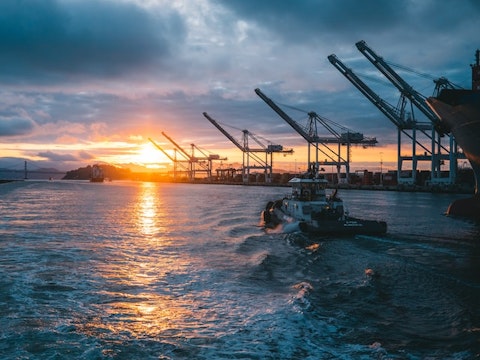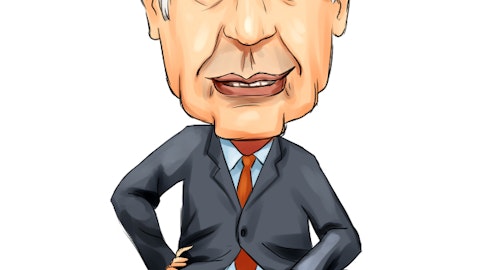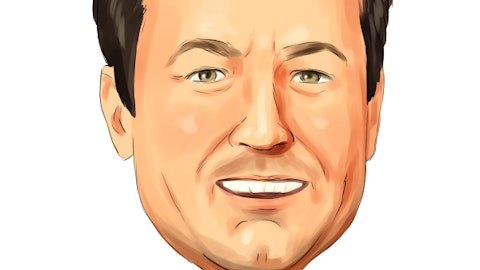SandRidge Energy, Inc. (NYSE:SD) Q4 2022 Earnings Call Transcript March 17, 2023
Operator: Ladies and gentlemen, thank you for standing by and welcome to the Q4 2022 SandRidge Energy Conference Call. I would now like to turn the call over to Scott Prestridge, Director of Finance and Investor Relations. Please go ahead.
Scott Prestridge: Thank you and welcome, everyone. With me today are Grayson Pranin, our CEO and COO; Salah Gamoudi, our CFO and CAO; as well as Dean Parrish, our SVP of Operations. We would like to remind you that today’s call contains forward-looking statements and assumptions, which are subject to risks and uncertainties, and actual results may differ materially from those projected in these forward-looking statements. We may also refer to adjusted EBITDA and adjusted G&A and other non-GAAP financial measures. Reconciliations of these measures can be found on our website. With that, I’ll turn the call over to Grayson.
Grayson Pranin: Thank you and good morning. I’m proud to report on another strong quarter and year results for SandRidge and that the company’s cost focus and efficient activity with high-graded drilling in the core of the Northwest STACK as well as our well reactivation program continue to add incremental economic production with strong free cash flow contribution from our producing assets this past year and projected in 2023. Before expanding on this, Salah will touch on a few highlights.
Salah Gamoudi: Thank you, Grayson. Production remained relatively consistent throughout the year, averaging 17.7 MBoe per day in 2022. This steady production profile was driven by the company’s stable, low-decline production base and 2022 drilling completion and workover programs. Net cash, including restricted cash, increased to approximately $257 million, which represents nearly $7 per share of our common stock issued and outstanding as of December 31, 2022. The company has no term debt or revolving debt obligations as of December 31, 2022, and continues to live within cash flow, funding all of its capital expenditures with free cash flow and cash held on the balance sheet. Over the quarter, the company generated adjusted EBITDA of approximately $43 million and approximately $191 million for the year.
As we have pointed out in the past, our adjusted EBITDA is a unique metric for SandRidge due to us having no i and very little t given that we have no debt and a substantial NOL position that shields our cash flows from federal taxes. Commodity price realizations in the fourth quarter, before considering the impact of hedges, were $79.10 per barrel and $4.40 per Mcf for oil and natural gas, and NGL realizations were $25.73 per barrel. The company maintains its commitment to protecting shareholder capital invested in its development program with commodity derivative contracts for natural gas. The commodity derivative contracts have an average strike price of $8.39 per MMBtu with a mark-to-market asset value of $4.4 million as of December 31, 2022.
As alluded to earlier, we have maintained our large federal NOL position, which is estimated to be approximately $1.6 billion as of the end of last year. Our NOL position has and will continue to allow us to shield our cash flows from federal income taxes. Our commitment to cost discipline has continued to be impactful. And despite increased activity, adjusted G&A for the quarter was approximately $2 million and approximately $8 million or $1.22 per Boe for the year, which was below the low point of guidance. We have also held LOE and expense workovers to approximately $11 million for the quarter and approximately $41 million or $6.39 per Boe for the year, which was below the midpoint of guidance. This level of expense is partially driven by an increase in workover activity associated with our well reactivation program.
We believe we compare favorably with our peers in regards to G&A and LOE on both an absolute and a per Boe basis. We continue to generate net income for our shareholders. During the quarter, we earned net income of $105.2 million or $2.86 per share and cash provided by operating activities of $30.1 million. Before shifting to our outlook, we should note that our earnings release and 10-K provide further detail on our financial and operational performance during the quarters.
Grayson Pranin: Thank you, Salah. Thought it would be helpful to walk through some of the company’s highlights, management strategy and other business details. As I mentioned previously, we are pleased with the results from last year, capitalizing on commodity price dynamics with high rate of return drilling on the Northwest STACK, continued well reactivations and further strengthened cash flow from our producing properties in Mid-Con. We’re able to keep production from our Mid-Con assets consistent for the year at 17.7 MBoe per day with a continued benefit from approximately 180 wells reactivated since 2021, while increasing oil volumes more than 25% from the first to second half of the year, aided by the oilier content of our new Northwest STACK wells.
In addition, we have converted artificial lift systems of 28 wells to their long-term systems, which will aid in optimizing lifting efficiency and lower point forward costs for this well set. The systems we have and will be installing are tailored to the wells’ current fluid production and will reduce the electrical demand from the current artificial lift systems and is key to decreasing utility costs. These types of investments, optimizing our wells production profile and cost focus, have contributed to the flattening expected asset-level decline of our already producing assets to an average of approximately 8% over the next 10 years. We successfully drilled 8 wells and are now producing 6 wells from last year’s capital program, which have all targeted the Meramec in the core of the Northwest STACK play, while 7 and 8 were recently completed and are anticipated to have first production this month.

Photo by Ronan Furuta on Unsplash
And operational highlights, the recent wells completed from a dual pad averaged over 1,000 Boe per day in the first 90 days. Also, the first well turned in-line in the program, also from a dual pad, have our production rate that on average is 18% higher than the original well in section after 239 days. Let’s pause for a moment to revisit the key highlights of SandRidge. Our asset base is focused in the Mid-Continent region with a primarily PDP well set, which do not require any routine flaring of produced gas. These well-understood assets are most fully held by production with a long history, shallowing and diversified production profile and double-digit reserve life. PV-10 of future net discounted cash flows to proved developed oil, gas and NGL reserves of these assets is approximately $811 million, based on the year-end 2022 SEC pricing and assumptions and effective date of January 1, 2023.
These assets include more than 1,000 miles each of owned and operated SWD and electric infrastructure over our footprint. This substantial owned and integrated infrastructure provides the company both cost and strategic advantages, bolstering asset operating margins through reduced lifting as well as water handling and disposal costs and combined with other advantages, healthy risk individual wealth profitability for nearly 70% of producing wells down to $40 WTI and $2 Henry Hub. In addition, the interconnectivity and ample capacity help buffer against unforeseen curtailment. Our assets continue to yield significant free cash flow with total net cash now totaling $257 million with 0 debt as of year-end. This cash generation potential provides several paths to increase shareholder value realization and is benefited by relatively low G&A burden.
As we realize value and generate cash, our Board is committed to utilizing our assets, including our cash to maximizing shareholder value. SandRidge’s value proposition is materially derisked from a financial perspective by our strengthened balance sheet, robust net cash position, financial flexibility and over $1.6 billion in NOLs. Further, the company is not subject to MVCs and other significant off-balance-sheet financial commitment. The company’s natural gas commodity derivative contracts have an average strike price of $8.39 per MMBtu with a mark-to-market asset value of $4.4 million as of December 31, 2022. We could enter into additional commodity derivative contracts from time to time to secure returns for our capital campaign, manage commodity risk or other fundamental drivers.
Finally, it’s worth highlighting that we take our ESG commitment seriously and have implemented disciplined processes around this. We remain committed to our strategy to focus on growing the cash value and generation capability of our business in a safe, responsible, efficient manner while prudently allocating capital to high-return organic growth opportunities and remain open to value-accretive opportunities. The company will continue to monitor forward-looking commodity prices, results, costs and other factors that could influence returns on investments, which will continue to shape its disciplined development decisions in 2023 or beyond. This strategy has 5 points. Maximize the cash value and generation capacity of our incumbent Mid-Con PDP assets by extending and flattening our production profile with high rate of return workover, well reactivations and artificial lift conversions as well as continuously pressing on operating and administrative costs.
The second is ensure we convert as much EBITDA to free cash flow as possible while exercising capital stewardship and investing in projects and opportunities that have high risk-adjusted fully burdened rates of return to include executing on our drilling program in the core of the Northwest Stack to economically add production. The third is to maintain optionality to execute on value-accretive merger and acquisition opportunities that could bring synergies, leverage to the company’s core competencies, complement its portfolio of assets, further utilizes approximately $1.6 billion of net operating losses or otherwise yield attractive returns for its shareholders. Fourth, as we generate cash, we will continue to work with our Board to assess path to maximize shareholder value to include investments and strategic opportunities, return of capital and other uses.
Please note that the company’s cash position is also a strategic advantage and provides competitive leverage in evaluating M&A opportunities. Lastly, given the outlook on the interest rates, capital markets and impact the optionality on the number and type of opportunities that could become available at certain levels. Note that there is a high bar at both the management and Board levels for mergers and acquisitions and that management weighs the cost of its growing cash balance versus patience to evaluate and execute on accretive opportunities. Management will continue to progress these with earnest on multiple fronts, promote regular way, returns capital discussions, advance M&A evaluations, meet with shareholders and investors and work with our Board to expand path to maximize shareholder value.
Besides executing this year’s capital plan and operating in a safe and responsible manner, these topics remain paramount and a top priority. In the interim, we have secured favorable banking terms and keep our cash position diversified across interest-bearing accounts at multiple financial institutions. The final staple is to uphold our ESG responsibilities. Circling back to this year’s drilling program, despite recent downdraft in commodity prices, oil is maintained around mid- to upper $70 per barrel with the forward-looking curve flattening for the year. Henry Hub has fallen to the mid- to low $2 near term but is in contango, approaching $4 per MMBtu by year-end. Given these near-term dynamics and that our Mid-Con assets are 99% held by production, which preserves the tenure of our development options, we will be concluding our drilling program early this year.
We will continue to monitor commodity price dynamics and maintain flexibility to adjust further as may be warranted. Commodity prices firmly over $80 WTI and $4.00 Henry Hub or a reduction in well costs are needed before we return to exercise the option value of further developments. With that said, our team efforts to combat inflationary pressures and execute operationally has and will translate to attractive returns in our remaining capital program, which will further enhance the already meaningful cash flow from our base PDP assets. While this reduced activity is not enough to keep overall Boe production flat, we expect oil volumes to increase by nearly 5% at the midpoint of guidance from last year. Increasing the relative production volume weighting in oil, which has more attractive pricing near term, will further bolster our Boe realizations, which will translate to cash flow.
A focus area we will be developing with this year’s program has been previously delineated by SandRidge and other reputable operators. We know this area well and along 10-year history in the Mid-Con, it can leverage a very tight cost structure to add incremental barrels to our base production in a very efficient way. The remaining 4 wells that will be turned online this year will all be infill with co-development on dual payouts that leverage cost synergies and directly offset productive and profitable wells. In addition to drilling, we will be investing in 12 reactivations, 28 artificial lift conversions and leasing to support future development and more attractive commodity environments. We have continued to buy ahead of plan activity, having prepurchased casing for the drilling program, pumping units for capital workovers and other items.
In addition, we high-graded cost-efficient co-development opportunities. We’ll be utilizing company-owned equipment and employ other best practices. We are targeting gross D&C for a 1-mile lateral to average over $5 million or roughly over $1,000 per foot. Prior investment in prepurchases of equipment and materials to support our program have been key to warding off inflationary pressures in today’s market. While we will continue to lean forward into cost-control efforts, inflation will likely persist and remain a central focus this year and has bearing on unsecured costs. Also, the service sector has continued to be choppy as the service industry ramped to meet increased activity demand last year through adding new employees, pulling rigs out of the yard and stretching across supply chain weak points.
While we’ve been able to secure the equipment, material and services needed to execute, service efficiencies and equipment quality have been persistent pressure points across the industry. While recent or future activity deceleration may provide some relief to these issues, it may take additional time for further activity reduction before any associated benefit or cost reduction will be realized. Shifting to expenses. We were able to keep adjusted G&A to $8 million for the year, a slight reduction from the prior year, despite meaningful increases in capital activity. This continued efficiency stems from our core values to remain cost-disciplined as well as prior initiatives, which have tailored our organization to be fit for purpose. We continue to balance the weighting of field versus corporate personnel to reflect where we actually create value and outsource necessary but more perfunctory and less core functions, such as operations accounting, land administration, IT, tax and HR.
Despite expanding activity and producing well count, our total personnel remains just over 100 people. Although corporate personnel stand at 15 people, we have retained key technical skill sets that have both the experience and institutional knowledge of our areas of operations. Despite inflationary pressures, we were able to keep LOE and expense workovers to $41 million or $6.39 per Boe for the year, roughly 4% below the midpoint of guidance. While we will continue to actively press on operating costs, we anticipate expenses, specifically workover expenses, to remain near these levels as we continue to reactivate and repair more wells this year. The good news is that this will translate to additional production. However, while profitable, the remaining tranche of well reactivations have relatively high operating costs, which will increase power, water, chemical and other expenses both on an absolute and a per Boe basis.
In addition to the cost of an increase in producing well count, inflation will continue to be a theme. We will continue to combat inflationary pressures on expenses as well through rigorous bidding processes, securing material, equipment and services over an appropriate tenure to partially offset market increases as well as continuing to leverage our significant infrastructure, operation center and other companies’ manage. In summary, the company has $257 million net cash and cash equivalent at year-end, which represents nearly $7 per share of our common stock issued and outstanding; consistent Boe production over the last several quarters with a 25% increase in oil over the last 2 quarters from our Mid-Con producing assets; high-graded capital program with infill drilling in the core of the Northwest STACK and a continuation of our well reactivation program; low overhead top-tier adjusted G&A of $1.22 per BOE; no debt, in fact, negative leverage; significant free cash flow and a growing net cash position supported by a diverse production profile; flattening expected annual PDP decline to an average of approximately 8% over the next 10 years multi-digit reserve life asset base; $1.6 billion in NOLs, which will shield future free cash flow from federal income tax; large owned and operated SWD and electrical infrastructure, which provides cost and strategic advantages, requiring little to no future capital to maintain.
Before we conclude our prepared remarks, I would like to point you to the 2023 operational and capital guidance included in our earnings release for more detail on this year’s program. Thank you for your time. We’ll now open the call to questions.
See also 10 Best Stocks to Buy for the Next 10 Years and 15 Under-the-Radar High Dividend Stocks to Buy.
Operator:
Operator: Thank you, ladies and gentlemen. This does conclude today’s call. Thank you for your participation. You may now disconnect.
Follow Sandridge Energy Inc (NYSE:SD)
Follow Sandridge Energy Inc (NYSE:SD)
Receive real-time insider trading and news alerts





